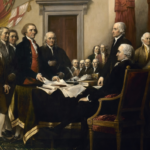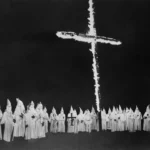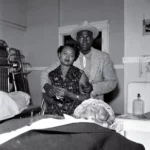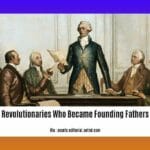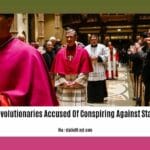Get ready to explore the wild history of voter fraud in Kansas, a state where elections have been as bumpy as a wagon ride on the prairie. From the days of rogue voters crossing borders to mess with elections, to modern-day whispers of shady shenanigans, voter fraud has been a real headache for the Sunflower State. Come along as we dig into this tangled web of ballots, lies, and the battle for democracy.
A State Forged in Controversy: Voter Fraud and Kansas Statehood
Let’s dive into the turbulent waters of Kansas politics, where allegations of voter fraud have been swirling for over a century. From the fiery birth of the state during the Bleeding Kansas era to the headline-grabbing claims of recent times, the fight for a fair and representative government has been anything but straightforward.
A State Born from Conflict: Bleeding Kansas
Kansas officially joined the United States in 1861, but its path to statehood was paved with conflict. Imagine a time when the issue of slavery deeply divided the nation, and Kansas was caught in the crosshairs. The decision of whether or not to allow slavery in the new state ignited fierce passions, leading to violence and widespread accusations of election rigging.
Pro-slavery advocates, often dubbed “Border Ruffians,” flooded across the border from Missouri, allegedly casting illegal votes to sway elections in their favor. These accusations, while difficult to prove definitively due to the chaotic nature of the era, fueled distrust and violence, turning Kansas into a battleground that foreshadowed the horrors of the Civil War.
Even after Kansas officially became a free state, the legacy of voter suppression and disenfranchisement, particularly targeting Black Americans and other minority groups, continued to cast a long shadow over the state’s political landscape.
Kris Kobach and the Fight Against (Alleged) Fraud
Fast forward to the 21st century, and the debate over voter fraud reignited under the leadership of then-Kansas Secretary of State Kris Kobach. Kobach, a staunch advocate for stricter voting laws, made headlines with his claims of widespread voter fraud, arguing that it was essential to implement voter ID laws and other measures to ensure election integrity.
However, Kobach’s accusations were met with skepticism and legal challenges. A federal court ultimately dismissed his claims, citing a lack of substantial evidence to support the existence of widespread voter fraud. Notably, Kobach’s own data revealed that over a 20-year period, there were fewer than 40 instances of non-citizen voter registration attempts in a county with 130,000 registered voters.
Echoes of the Past: Voter Fraud Allegations in Modern Kansas
Since the 2020 presidential election, the issue of voter fraud has once again taken center stage in Kansas and across the nation. Fueled by unsubstantiated claims of widespread irregularities, election officials in Kansas have faced unprecedented scrutiny, harassment, and even threats.
This toxic atmosphere has had a chilling effect on those tasked with ensuring free and fair elections. A staggering one-third of Kansas election officials have resigned from their positions since 2020, citing the relentless pressure and hostility they have faced. This exodus of experience raises serious concerns about the state’s ability to conduct secure and reliable elections in the future.
Adding to the complexity, the Kansas Supreme Court recently ruled that voting is not a guaranteed right under the state’s constitution. This decision has sparked outrage among voting rights advocates who fear that it could pave the way for further restrictions on voting access, potentially disenfranchising marginalized communities.
Is Kansas More Vulnerable to Voter Fraud Than Other States?
The combination of historical context, recent high-profile accusations of voter fraud, and the exodus of experienced election workers in Kansas raises a critical question: is Kansas more susceptible to voter fraud than other states?
While definitive data comparing election official resignations across all states is not readily available, the significant number of departures in Kansas suggests a potential vulnerability. The loss of institutional knowledge and experience, coupled with the erosion of public trust in the electoral process, creates a concerning situation.
Moreover, the upcoming 2024 presidential election is likely to bring even greater scrutiny and pressure on election systems across the country. For Kansas, with its history of election controversies and its current climate of heightened skepticism, the stakes are particularly high.
Protecting Democracy: Balancing Election Security and Voter Rights in Kansas
As Kansas moves forward, it faces the crucial challenge of balancing the need for election security with the fundamental right to vote. The state must find ways to restore public trust in its electoral process while ensuring that all eligible voters can exercise their right to participate in a democracy.
This requires a multi-faceted approach that includes:
- Combating Misinformation: Kansas must actively counter the spread of misinformation and conspiracy theories about voter fraud. This involves promoting media literacy, fact-checking dubious claims, and emphasizing the integrity of the state’s election systems.
- Supporting Election Workers: It’s crucial to provide election workers with the resources, training, and support they need to do their jobs effectively and safely. This includes addressing the issue of harassment and threats, ensuring adequate compensation, and recognizing the vital role they play in upholding democracy.
- Expanding Voter Access: Kansas should prioritize policies that make voting more accessible, particularly for marginalized communities that have historically faced barriers to participation. This includes expanding early voting periods and locations, simplifying voter registration processes, and ensuring language access for voters with limited English proficiency.
- Promoting Transparency and Accountability: Building public trust requires transparency in election administration and clear accountability mechanisms for any irregularities. This includes open communication about election processes, independent audits of election results, and accessible channels for voters to report concerns.
The fight for fair and accessible elections is an ongoing process, requiring vigilance and a commitment to democratic values. Kansas, with its rich and often tumultuous history, has a unique opportunity to learn from its past and forge a path toward a more inclusive and trustworthy democracy.
- Unlock Water’s Symbolism: A Cross-Cultural Exploration - April 20, 2025
- Identify Black and White Snakes: Venomous or Harmless? - April 20, 2025
- Unlocking Potential: Origins High School’s NYC Story - April 20, 2025


